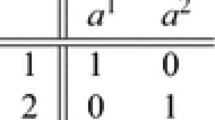Abstract
The book-making argument was introduced by de Finetti as a principle to prove the existence and uniqueness of subjective probabilities. It has subsequently been accepted as a principle of rationality for decisions under uncertainty. This note shows that the book-making argument has relevant applications to welfare: it gives a new foundation for utilitarianism that is alternative to Harsanyi’s, it generalizes foundations based on the theorem of the alternative, and it avoids arguments based on expected utility.
Similar content being viewed by others
References
Allais, M. (1953), The foundations of a positive theory of choice involving risk and a criticism of the postulates and axioms of the American school, in Allais, M. and Hagen, O. (1979, eds.), Expected Utility Hypotheses and the Allais Paradox, Dordrecht: Reidel, pp. 27–145.
Atkinson A.B. (1970) On the measurement of inequality. Journal of Economic Theory 2, 244–263
Broome J.R. (1991) Weighing Goods. Oxford, UK, Basil Blackwell
Bunn D.W. (1984). Applied Decision Analysis. New York, McGraw-Hill book Company
Camerer C. (1995) Individual decision making. In: Kagel J.H., Roth A.E. (eds) Handbook of Experimental Economics. Princeton, NJ, Princeton University Press, pp. 587–703
de Finetti, B. (1931), Sul significato soggettivo della probabilità, Fundamenta Mathematicae 17, 298–329. Translated into English as ‘On the subjective meaning of probability,’ in Monari, P. and Cocchi, D. (eds., 1993), Probabilità e Induzione, Bologna: Clueb, pp. 291–321.
Diecidue E., Wakker P.P. (2002) Dutch books: avoiding strategic and dynamic complications, and a comonotonic extension. Mathematical Social Sciences, 43, 135–149
Ebert U. (1988) Measurement of Inequality: an attempt at unification and generalization. Social Choice and Welfare 5, 147–169
Gold M.R., Siegel J.E., Russell L.B., Weinstein M.C. (1996) Cost-Effectiveness in Health and Medicine. New York, Oxford University Press
Hammond P.J. (1988) Consequentialist foundations for expected utility. Theory and Decision 25, 25–78
Harsanyi J.C. (1955) Cardinal Welfare, Individualistic Ethics, and Interpersonal Comparisons of utility. Journal of Political Economy 63, 309–321
Kahneman D., Tversky A. (1979) Prospect theory: an analysis of decision under risk. Econometrica 47, 263–291
Kahneman D., Wakker P.P., Sarin R.K. (1997) Back to Bentham explorations of experienced utility. Quarterly Journal of Economics 112, 375–405
Kolm S.C. (1969) The optimal production of social justice. In: Margolis J., Guitton H. (eds) Public Economics. London, MacMillan, pp. 145–200
Machina M.J. (1989) Dynamic consistency and non-expected utility models of choice under uncertainty. Journal of Economic Literature 27, 1622–1688
Nau R.F., McCardle K.F. (1990) Coherent behavior in noncooperative games. Journal of Economic Theory 50, 424–444
Neuefeind W., Trockel W. (1995) Continuous linear representability of binary relations. Economic Theory 6, 351–356
Rabin M. (2000) Risk aversion and expected-utility theory: a calibration theorem. Econometrica 68, 1281–1292
Rawls J. (1971) A Theory of Justice. Cambridge, MA, Harvard University Press
Savage L.J. (1954) The Foundations of Statistics. New York, Wiley
Schmidt U. (2004) Alternatives to expected utility: some formal theories. In: Barberà S., Hammond P.J., Seidl C. (eds) Handbook of Utility Theory, Vol. 2. Dordrecht, Kluwer Academic Publishers, pp. 757–838
Starmer C. (2000) Developments in non-expected utility theory: the hunt for a descriptive theory of choice under risk. Journal of Economic Literature 38, 332–382
Turunen-Red A.H., Woodland A.D. (1999) On economic applications of the Kuhn-Fourier Theorem. In: Wooders M.H. (eds) Topics in Mathematical Economics and Game Theory: Essays in Honor of Robert J. Aumann. Toronto, University of Toronto
Varian H.R. (1987) The arbitrage principle in financial economics. Journal of Economic Perspectives 1(2):55–72
von Neumann J., Morgenstern O. (1947) Theory of Games and Economic Behavior. Princeton NJ, Princeton University Press
Weymark J.A. (1981) Generalized gini inequality indices. Mathematical Social Sciences 1, 409–430
Yaari, M.E. (1985), On the role of “Dutch books” in the theory of choice under risk. 1985 Nancy L. Schwartz Memorial Lecture, Evanston, IL: J. L. Kellogg Graduate School of Management, Northwestern University.
Yaari M.E. (1988) A controversial proposal concerning inequality measurement. Journal of Economic Theory 44, 381–397
Author information
Authors and Affiliations
Corresponding author
Rights and permissions
About this article
Cite this article
Diecidue, E. Deriving Harsanyi’s Utilitarianism from De Finetti’s Book-Making Argument. Theor Decis 61, 363–371 (2006). https://doi.org/10.1007/s11238-006-9019-x
Received:
Accepted:
Published:
Issue Date:
DOI: https://doi.org/10.1007/s11238-006-9019-x



